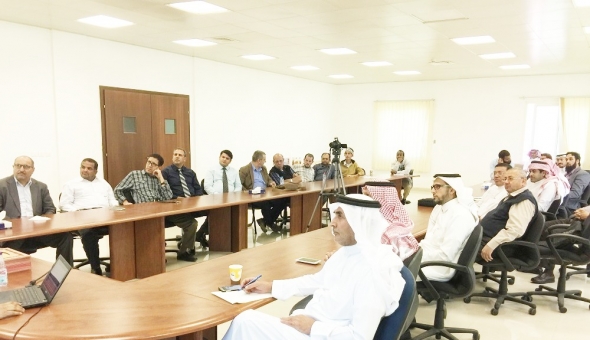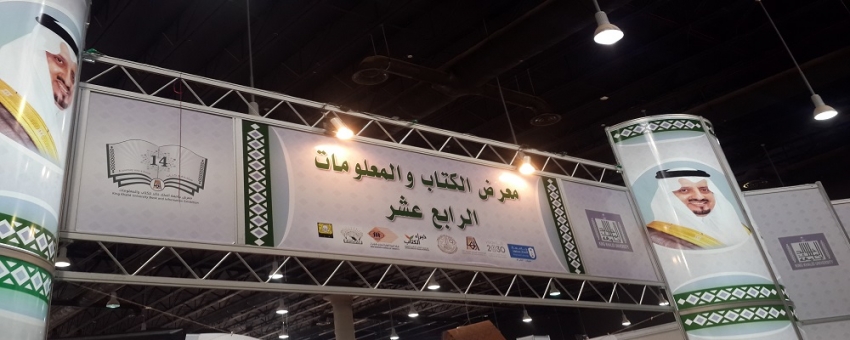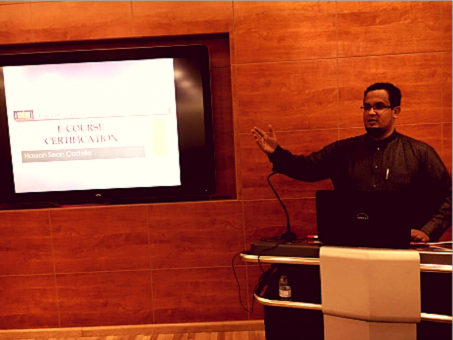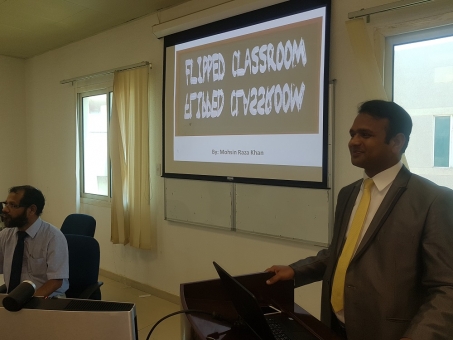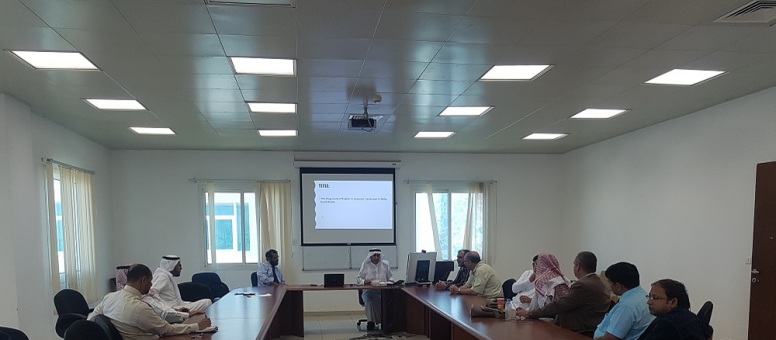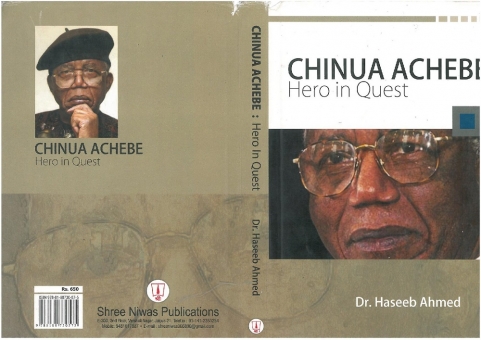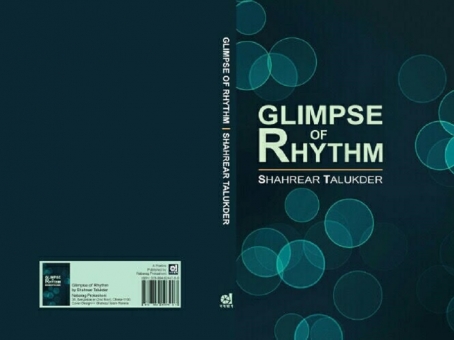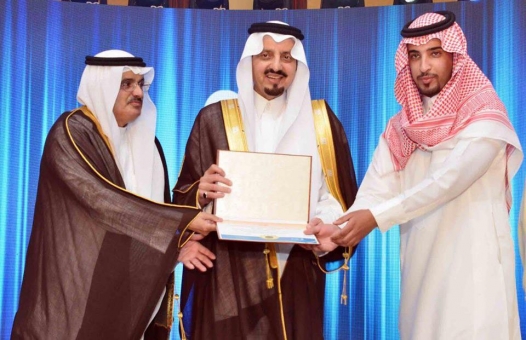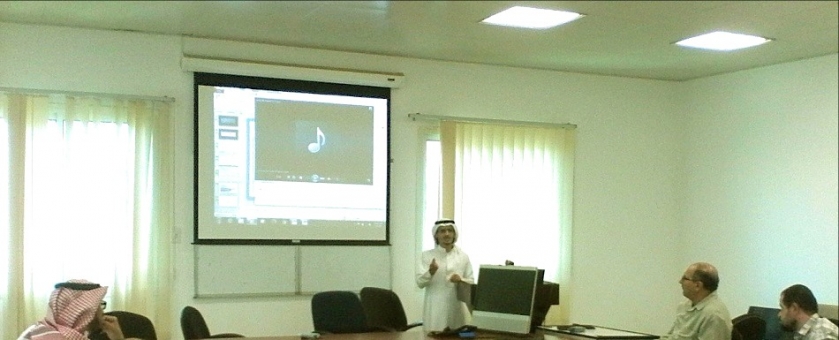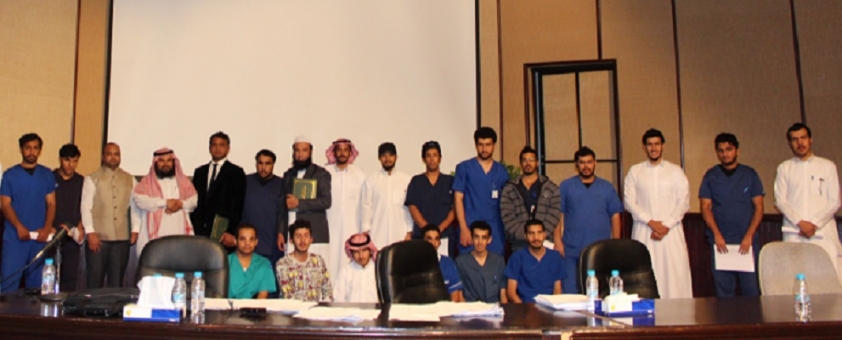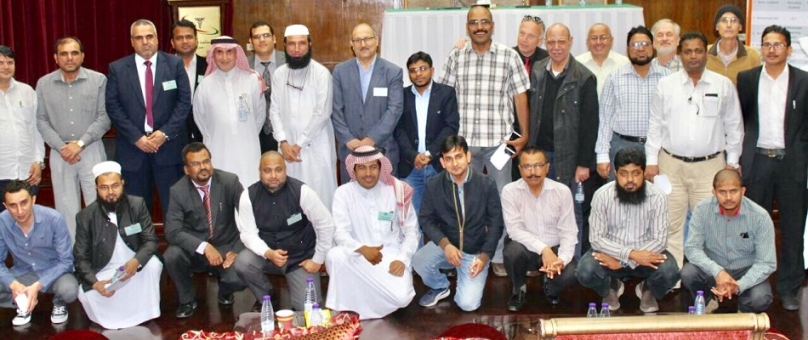News
In celebration of International Translation Day, the Female Campus held a seminar entitled "Reality Of Translation at the FLT Female Campus, Problems & Solutions" to discuss current issues related to translation and comprehensive solutions to them.The seminar witnessed active participation and large attendance. Nine versatile seminar papers were presented alongside a discussion of the major problems and practical solutions. The seminar started with a prelude by the Activities Coordinator, Mrs.AmatulHafeez Alvi, who cordially welcomed the audience and highlighted the central aspects of the event. After that, lecturers specialized in translation, Mrs.Safia Asiri, Mrs.Amal Metwally, and Ms.Sara Ateeq presented intriguing pieces of work enriching the seminar with their experience. Following that, seminar submissions were presented by M.A. students Roa'a Alshihri and Rana Alqahtani, then B.A. students Nora Nashir (level 7), Hajar Allqahtani (level 3), Manar Alqahtani (level 1) and Raghad Alshahrani (History Department).
The Dean's Assistant, Dr. Suad Alqahtani, commented by expressing her happiness with the success of the seminar and gratitude to the Activities Coordinator, Mrs.AmatulHafeez, and the lecturers, as well as the students, who participated in highlighting the importance of Translation. She expressed her strong will to solve the discussed issues and facilitate better teaching and learning of translation.The seminar was concluded by certificates of participation starting with a special thanks to Dr. Afaf Alsaidi for her valuable involvement as a mentor and judge for participant papers. Certificates were awarded to all participants and papers were displayed along with brochures related to the event.The audience expressed their appreciation and need for beneficial events in the college similar to this one to take place in the future.
Along with the seminar, a joint translation project was announced in cooperation with the Abha Cooperative Center For Call & Communities, "I Feel like Somebody Lied to Me" and "Why I Ask People to Become Muslims," by Yahya George Maxwell will undergo a series of revisions and translations.
Date: 11/7/2017
Source: Office of Relations & Media
Dr. Eyhab Bader Eddin delivered a presentation at a seminar organized by the Language Research Center of King Khalid University held on October 25, 2017. His presentation was centered on his Ph.D. thesis, which was titled Semantic Problems in A. J. Arberry’s Translation of the Suspended Odes (Al- Muallaqat).
Dr. Eyhab’s presentation began with what his thesis examined. He pointed out the semantic, lexical, morpho-syntactic and cultural problems in Arthur John Arberry’s translation of Al-Muallaqat, a group of long Arabic poems that means The Suspended Odes or The Hanging Poems. He also focused on the significance of his thesis as well as the reason why many researchers stay away from working on Al-Muallaqat, a collection of ancient Arabic odes, generally reckoned to be 7 in number, although some commentators extend their number to 9 or 10. However, all of them were composed in Arabia before Islam (during the 1st half of the 6th century). Some of the reasons, he mentioned, were its archaic vocabulary, fertile creative imagination and precise description of objects.
Dr. Eyhab also explained in detail the organization of thesis, methodology, topics analyzed and research findings. He finished his session by mentioning the contributions of research findings to the field, and the implications and recommendations for further research in this field.
The Women's College (FLT) also participated in the seminar via teleconferencing.
The presentation was very interactive and overall a great success.
You can view the presentation by clicking HERE.
For more information, please email Dr. Eyhab Bader Eddin at ealdeen@kku.edu.sa
Date: 10/25/2017
Source: MD Adil
Multimedia Contribution: Mohammad Taisir Albukaai
The presenters of the fortnightly seminars in the academic year of 1437-38 were awarded certificates of appreciation at the Certificate Award Ceremony held on October 25, 2017, which was arranged by the Language Research Center of the Faculty of Languages and Translation, King Khalid University.
The occasion was graced with the presence of Dr. Abdullah Al-Melhi, Dean of Faculty of Languages and Translation.
Certificates were awarded to Mr. Mohsin Khan for his presentation titled Incorporating Blackboard in EFL Teaching, Mr. Nabeel Ali Sayed whose presentation topic was Arabic is in English, Mr. Mahmudul Haque for his presentation titled Learner Autonomy and Metacognition in Language Learning, Dr. Eyhab Bader Eddin for his presentations titled Translation of Death as Clad in Euphemism and Non-lexical Equivalence in Translation, Dr. Abdul Wahed Zumor for the presentation titled A metacognitive and Social Strategy to Improve Content Lecture Comprehension, Mr. Erich Beer for his presentation titled From the Top of a Pole One Hundred Feet High, How Do You Step Forward? Questions, Intuitions and Pointers Relating to Reading Comprehension, Prof. Abdullah Hady Al Kahtany who shared his valuable Experience in Teaching, Prof. Habib Abdessalem and Mr. Hassan Costello whose presentation was titled Introductions in Locally Published Research Articles in Linguistics: Towards A Syntagmatics of Moves, Dr. Basim Kanan for the presentation titled The Effect of Expansion of Vision Span on Reading Speed: A Case Study of EFL Major Students at KKU, Dr. Sheila Simpkins who talked about Bloom’s Taxonomy, Dr. Haseeb Ahmed for his presentation titled What is Literature? Why Should We Study It?, Mr. Abdullah Omar for his presentation titled Awareness and Attitudes of Saudi Students toward World Englishes, Mr. Faruquzzaman Akan whose spoke about the topic of Barriers to Language Development, and Dr. Abdelhamid Bessaid who presented Rethinking the Main Objectives of Teaching English.
Date: 10/25/2017
Source: MD Adil
Multimedia Contribution: MD Sirajul Islam
Under the patronage of the Dean, Dr. Abdullah Al-Melhi and supervision of Dr. Muhammed Shuaib Asiri, Vice-Dean for Academic Development & Quality, the E-Learning Unit of the Faculty of Languages & Translation organized a presentation titled, "Recent Trends in E-Learning" by Mr. Syed Asif Abbas on Tuesday, October 24, 2017 at 11:00 am in the E-Learning Training Center A/3/86.
In his presentation, Mr. Syed Asif Abbas highlighted emerging trends such as micro-learning, multi-device compatibility, and VR-AR. He further emphasized the role of Artificial intelligence, interactive content, and learnability in online courses. He also added the importance of storytelling in motivating and engaging the students to give their learning, a purpose!
Responding to a query from Dr. Abdullah Al-Melhi (Dean) about future of writing through e-learning, Mr. Asif seconded his concerns that students are not improving their ability to write, and suggested to stop practicing transliteration.
To another query from the Vice-Dean for Academic Development, Dr. Muhammed Shuaib, he suggested that mobile learning is not an existential threat to e-learning rather it’s just a helping hand.
When Mr. Rizwan Ghani asked for the recommendations for e-learning in FLT, Mr. Asif responded that an expansion to the illustrative contents and use of wearable devices should be taken into consideration.
Mr. Abdullah Al-Rezgi, Director of English Language Center, and faculty members attended the presentation.
Mr. Mohsin Khan, E-Learning Unit Supervisor, proposed a vote of thanks to the seminar participants for the insightful feedback and recommendations.
Date: 10/24/2017
Source: E-Learning Unit
Multimedia Contribution: Javed Ahmad
The English Club paid a visit to the 14th Book and Information Fair to enhance student reading skills and spread the awareness of books and knowledge. The group consisted of the Dean's Assistant, Dr. Suad Al-Qahtani, the College Coordinator of Activities and Social Services, Mrs. AmatulHafeez Alvi, the College Coordinator of Public Relations and Media, Ms. Aisha Alvi, some faculty staff and 14 students. The group visited many book corners and purchased numerous books in both English and Arabic. After the visit, Dr. Suad Al-Qahtani held a meeting with the students to listen to their opinions about the visit. The students expressed their gratitude to her for availing them to unique opportunities that are beneficial.
"The book fair is amazing, the dean's assistant and lecturers are with us, and we really enjoyed and learned, " Amani said. " So beautiful, I found every book I wanted," Sara said. "Honestly it is wonderful, there are books that suit all ages, there are different and unique books," Taif said. "The books are so amazing! The treatment is nice and quite different from a couple of book fairs I visited before," Enas said. "Had a great time with our students and colleagues, a vote of thanks goes to the Dean's Assistant, Dr. Suad, for supporting such activities, and trips which intend to develop our student's linguistic and social ability and thanks to KKU for arranging this successful fair," Mrs.AmatulHafeez, Activities and Social Services Coordinator said.
Date: 19/10/2017
Source: Office of Relations & Media.
Under the supervision of the Vice Presidency of Student Affairs, the Faculty of Languages and Translation (Female Campus) participated in the program "Proud Of My Femininity" which aimed at strengthening the instinctual feminine nature and fighting the unnatural behaviors. The English Club presented a corner titled "Proud of My Look and Proud of My Innateness." The corner included different models, brochures, and slogans. The English Club students provided brief instructional presentations to the students about the program and offered generous gifts.
Date: 10/18/2017
Source: Public Relations & Media Office.
FLT Language Instructor, Hassan Costello, delivered a presentation on October 17, 2017, aimed at increasing awareness of the Quality Matters (QM) peer review and certification processes in online education.
The presentation, “E-Course Certification,” was organized by the E-Learning Unit under the patronage of the Dean, Dr. Abdullah Al-Melhi, the supervision of Dr. Muhammed Shuaib Asiri, Vice-Dean for Academic Development & Quality, and the guidance of Dr. Munassir Alhamami, Chairman, and Mr. Abdullah Al-Rezgi, Director of the English Language Center.
Those who attended got the chance to learn about the QM Rubric and the framework required to improve the quality of their online and blended courses ultimately leading to certification.
The foundation of the workshop focused on the three stages of the course development process that need to be implemented in order to meet the rubric standards of the International Quality Matters (QM) Peer Review Board. The three stages are:
• Stage 1: Identify Desired Results
• Stage 2: Determine Acceptable Evidence
• Stage 3: Plan the Learning Experiences and Instruction
“The standards of the rubric are written, so that faculty and reviewers approach a course through the eyes of the student. In doing so, it serves as a method to assure the quality of online courses. There are a lot of great reasons to go through the Quality Matters certification process, and hopefully a few of the examples and resources I’ve made you aware of today have helped you to see that you can do it too," Costello said.
A call to action was put forth at the end of the presentation by asking all participants to contact the E-Learning Deanship in cooperation with the FLT’s E-Learning Unit Supervisor, Mr. Mohsin Raza Khan, and our assigned E-Learning Specialist, Mr. Muhammed Jabir Asiri. If enough interest is generated, QM's flagship Applying the Quality Matters Rubric (APPQMR) workshop and its use in reviewing the design of online and blended courses will be conducted in the near future.
Date: 10/17/2017
Source: E-Learning Unit
Multimedia Contribution: Javed Ahmad
Mr. Mohsin Raza Khan shared his ideas at a seminar organized by the Language Research Center of King Khalid University on October 11, 2017. In his presentation, which was titled Flipped Model Classroom, he highlighted the effectiveness of a flipped model classroom.
A flipped model classroom is, as Mohsin defined, a pedagogical model in which typical lectures and homework elements are reversed. In his presentation, he mentioned the names of the pioneers (Jon Bergmann and Aaron Sams) of such a model. He illustrated the difference between a traditional classroom and a flipped model one. His illustration showed that a traditional classroom starts with ‘lecture today,' whereas a flipped one with ‘activity today.' It means that students watch lectures at home, but do engaging activities in the classroom.
Mohsin emphasized that a flipped model classroom can make our learners more involved in the learning process. Such a model has better learning outcomes, he added. He also mentioned some recent research conducted in Saudi Arabia in this particular area.
It is worth noting that King Abdullah Road and Al Samer campus also joined the session online.
The seminar was very informative and interactive, and successful.
Date: 10-11-2017
Source: MD Adil
Multimedia Contribution: MD Sirajul Islam
Under the patronage of the Dean, Dr. Abdullah Al-Melhi and supervision of Dr. Muhammed Shuaib Asiri, Vice-Dean for Academic Development & Quality and Dr. Yahya Assiri, Vice-Dean of the College, the E-Learning Unit of the Faculty of Languages & Translation organized a presentation titled, A Perspective on KKU: Online International Testing Center by Mr. Rizwan Ghani on Tuesday, October 10, 2017 at 11:00 am in the E-Learning Training Center A/3/86.
Mr. Rizwan Ghani proposed establishing an online International Testing Center (ITC) at King Khalid University for holding international tests like the ACT, CLEP, AP, PISA, ACT, GRE and SAT. Mr. Ghani said that the ITC could help students, professionals, and the public gain access to approved international courses, training, examinations, and entry/admission tests locally as part of quality education, standardized testing and community service in the Asir Region. Mr. Ghani also mentioned that the ITC could help KKU to standardize education, reduce costs for many elements of the testing lifecycle, and support candidates realize optimum convenience by offering tests on-demand and year-round. It also serves to assist accelerated graduation pathways. He also pointed out that digital education and computer-based testing (CBT) may help align high school and university education and testing in KKU and the Asir Region with global standards. As a result, our students will be familiar with them from an early age, and it will enable them to do well in courses, examinations entry, admission tests and jobs at the local and global level.
Mr. Abdullah Al-Rezgi, Director of the English Language Center, Mr. Muhammed Jabir Asiri, E-Learning Specialist, and faculty members graced the occasion. Mr. Mohsin Khan, E-Learning Unit Supervisor, and Mr. Rizwan Ghani proposed a vote of thanks to the seminar participants for the insightful feedback and recommendations.
Date: 10-10-2017
Source: E-Learning Unit
Nadia Mohammed Aloraij, an MA student, delivered a presentation titled The Hegemony of English in the Linguistic Landscape of Abha at a seminar organized by the Language Research Center of King Khalid University held on October 04, 2017. The seminar took place at the King Abdullah Road campus. In her presentation, she focused on how English has influenced Arabic in Abha in various sectors.
The primary objectives of her study were to examine the use of English side-by-side with Arabic and to investigate social and psychological attitudes towards the spread of English in commercial signs and identify the policy of using English on commercial signs in the KSA.
Nadia, while talking about the significance of her study, mentioned her concerns about the influence of English that severely affects the mother tongue. For her research method, she chose shop signs on three main streets of Abha. After her quantitative analysis, she concluded that Arabic is still the predominant language.
The seminar was very interactive, engaging and overall successful. It is worth noting that Graigor campus also participated in the seminar through video conferencing.
Date: 10-4-2017
Source: MD Adil
Multimedia Contribution: MD Sirajul Islam
The Faculty of Languages and Translation is pleased to announce the re-release of a book entitled Chinua Achebe: Hero in Quest (ISBN.978-81-88730-57-5) by Dr. Haseeb Ahmed who teaches at the Faculty of Languages and Translation. He has attended and presented research papers in many national and international seminars/conferences. In addition to a few pieces of creative writing, he has 12 research papers to his credit. Under postdoctoral studies, he accomplished two research projects.
The book deals with the literary endeavors of the most celebrated Nigerian writer Chinua Achebe. Achebe has won many prestigious awards including the Man Booker Prize in 2007. He was also nominated for the Nobel Prize. Dr. Haseeb Ahmed explores the fictional world of Achebe with a particular focus on the cultural predicament of his heroes. He demonstrates how Achebe's heroes maintain a balance between the inner and outer, the social and psychological, the individual and communal, and the ideal and practical conditions of their existence. The author points out how these heroes, manifesting African ethos, confront the given adverse situations and present the psycho-dynamics of the self against the onslaught of the colonial authoritarianism, and how they resist and overcome the apparatus of appropriation inserted into the fabric of their consciousness. This book comprehensively deals with the issues of psychological bondage and liberation, cultural and psychic colonization and decolonization, slavery, and freedom in the backdrop of third world countries. Dr. Ahmed's publication is currently available at AbeBooks UK, a subsidiary of Amazon.com, Inc.
Date: 10/2/2017
Source: FLT Media Center
Under the supervision of Dean, Dr. Abdullah Al Melhi, celebrations to commemorate the KSA's 87th National Day were held yesterday (9/27/2017) in Building B, Auditorium 5, where students, faculty, and staff alike enjoyed a historical account of the Kingdom's history, poetry recitals, and a new student orientation program. Held in conjunction with the Annual Orientation Program, the celebration also aimed to acquaint students with the range of services available to them, academic integrity standards, and insight into what University life would be like in the Faculty of Languages and Translation.
Al-Melhi: We are lucky to have the Custodians of Saudi Arabia from King Abdulaziz, may Allah have mercy on him, to King Salman. Every Royal Majesty of this great nation has done his best to focus on the development of the Saudi citizen, the country itself, and education.
Dr. Abdullah Al Melhi stressed that the National Day celebration is a unifying cornerstone event. He emphasized that it gives them an opportunity to reflect on the sacrifices of the previous generations who set the groundwork for the stability and prosperity we all enjoy today. "We are lucky to have the Custodians of Saudi Arabia from King Abdulaziz, may Allah have mercy on him, to King Salman. Every Royal Majesty of this great nation has done his best to focus on the development of the Saudi citizen, the country itself, and education." Dr. Al Melhi added that the central theme of the FLT's Saudi National Day celebration is to invest in the students for a promising future. He encouraged them to be active, to study hard, and to remember what they learned in orientation to avoid the major pitfalls and mistakes of their Freshman Year.
In an effort to drive the message home, Dr. Yahya Asiri, Vice Dean, explained that the main theme of the FLT's National Day Celebration and Annual Orientation Program was chosen to instill excellent values in our students who will participate in the nation's development and give back to society upon graduation. He also urged students to follow the 'Code of Conduct' and to aim high in their studies. Immediately following Dr. Asiri, Chairman, Dr. Munassir Al Hamami, provided a detailed tour of the FLT website and social media accounts showing students where they could find their study plan and contact the faculty. He urged students to be aware that the transition from high school to university is not an easy one; it requires commitment and hard-work.
The program this year was very productive covering all issues concerning the University. Dr. Basim Kanan, Academic Advisor, followed Dr. Al Hamami's presentation and conveyed the most important issues that students will face as well as the different ways to get in touch with him or other faculty members. Following after was Director of Student Activities, Hassan Faya Asiri, who encouraged students to join the English Club and participate in its activities. He advised students to focus on the big picture and to avoid distractions.
A vote of thanks goes to the following organizing members who made this event a success:
The College Administrators (Muhammad, Al Gaees, Saleh Al Yami, and Sultan Al Hasher)
All members of the English Club (Ahmed Al Otaibi, Haitham Hawi, Ali Saeed, and Hussam Al Mashlwe)
Date: 9/28/2017
Source: FLT Media Center
Multimedia Source: Turki Saad Al Qahtani, Level 1 FLT Student
Under the supervision of Mohammed Jarallah, Training Manager, the Deanship of E-Learning organized a training session open to all new faculty members university-wide. Mohsin Raza Khan, Supervisor of the E-Learning Unit, Faculty of Languages & Translation, was invited to conduct the training session. He introduced the new faculty members to the concept of E-Learning. Mohsin familiarized the faculty members with our learning management system (Blackboard) and made them aware of the processes involved in uploading and organizing content for their Fall 2017 courses. He also focused on the standards of the internationally acclaimed Quality Matters Program (QM). Mohammed Jarallah thanked all of the participants, FLT Lecturer Jawed Ahmed, and the Faculty of Languages & Translation for their enthusiastic support.
Date: 9/20/2017
Source: FLT Media Center
The Faculty of Languages and Translation is pleased to announce the release of FLT Lecturer, Sharear Talukder's, Glimpse of Rhythm. This is the author's first published book of poetry, and it addresses a wide-range of subjects including but not limited to citizen rights, freedom, and social justice. "I decried the injustice of every manner but cried for a world full of hope and aspiration through my work," added Shahrear. He demonstrated his angst and anger in words. Candidly, this Glimpse of Rhythm is a Glimpse of Truth. You can contact the author by visiting his blog at https://shahrear.com/.
Date: 9/17/2017
Source: FLT Media Center
Ahmad Al Otaibi is a student at the Faculty of Languages and Translation, and he is a journalist at Aseer News. Lately, due to his continues press and social media coverage for the Abha Charity Association and as a representative of Aseer News, he received an appreciation certificate from the Governor of the Asir Region, HRH Prince Faisal bin Khalid bin Abdulaziz. "Ahmad sets an example of how a college student can actively contribute to the community while continuously striving for academic success," said Dr. Abdullah Al Melhi, FLT Dean. It is worth mentioning that Ahmad is also an active member in many activities as Vice President of the English Club.
Date: 8/17/2017
Source: Abdullah Omar (KKU IT)
On Monday, May 01 2017, Abdullah Omar, an MA student at King Khalid University held a presentation titled Awareness and Attitude of Saudi Students towards World Englishes in a seminar organized by the Language Research Center of the Faculty of Languages and Translation. It was based on his MA research proposal. The study aimed to measure the awareness and attitude of the male undergraduate students at King Khalid University towards World Englishes.
Abdullah Omar began his discussion with the history of World Englishes. While talking about its history, he related that the rapid spread of English around the world as the primary factor that contributed to the concept of World Englishes. He cited some scholars who conducted research in the field of World Englishes. Despite the fact that in Saudi Arabia, there are people from different parts of the world who speak English, Abdullah pointed out, most of the higher level students are not aware of this phenomenon.
The session was very engaging and entertaining.
Date: 05/02/2017
Source: MD Adil
Inauguration
The 12th Annual Research Day, under the supervision of Dean, Dr. Abdullah Al Melhi, and Dr. Ismail Al Refaai, Director of the Language Research Center, was held on April 20, 2017, at King Khalid University. The program began with a recitation of the Holy Quran and a welcome speech by Dr. Abdullah Al Melhi. In his speech, he emphasized the vital importance of not only participating in Research Day 2017 but also expressed that new directions of inquiry and new insights from the 12th Annual Research Day will provide a platform for all of us to discover, imagine, and create. He praised our talented faculty members for their research contributions and appreciated their creative endeavors. He also thanked the organizing committee who worked tirelessly behind the scenes to ensure the event was outstanding.
First Session
The theme of the first session was Bilingualism. The first speaker was Dr. Munassir Alhamami whose presentation was titled English and Arabic in the College of Sciences. It was based on his research that aimed at investigating the use of English as the Medium of Instruction in Saudi Science Colleges. He pinpointed many issues associated with the use of English as a Medium of Instruction. This was followed by Dr. Oveesa Farooq’s presentation titled Need of a Syntax-based Interpretation of Learning English as a Second Language among Arabic Speakers. She focused on the significance of having a working knowledge of phonology, morphology, syntax and semantics. Her research, she pointedly said, underpinned the idea that native Arabic speakers’ poor knowledge of the four skills is the result of their lack of knowledge concerning the language system.
Dr. Abdul Wahed Al Zumor, who appeared third, in his presentation titled Arabic Language Policy and Planning in Saudi Arabia, highlighted the efforts the Kingdom had been doing since 1346H. The study aimed to attract researchers’ attention to the issue of Arabic language policy and planning. He concluded that this country’s development and its language policy are in step. Dr. Hasan Jaashan’s topic was Topographical Divergences and their Impact on Linguistic Variation. His presentation was based on his study that aimed to determine the phonological features of people who live in mountain areas as opposed to those who live in the coastal regions. His conclusion was that people living in mountainous regions use more complex phonological structures than those living in coastal regions. Dr. Shadma Iffat’s presentation was titled An Overview of Students-Teachers Relationship in Colleges and its Effect on Students’ Academic Achievement. She pointed out that Teacher-Student relationships can be the key to students' attitudinal motivations that exist towards learning.
Second Session
The speakers of the second session had various presentations on the themes of Technology, Translation, and Literature. Dr. Mona Hamad talked about the Pros and Cons of Using Blackboard Collaborate for Blended Learning on Students Learning Outcomes. She identified some issues related to blended learning. She termed poor internet access as one of the factors that affect blended learning negatively. She also emphasized that Blackboard Collaborate for blended learning is convenient for learners who have problems with attending face-to-face lectures. Ms. Karima Ali Sallem spoke about The Role of Teacher in the Age of Globalization. She emphasized the concept of a globally competent teacher and his or her roles when facing complex challenges.
Mr. Samsur Rabb Khan had a presentation titled Teaching Literature in Language Classrooms: Why and How? He, while highlighting the significance of his study, mentioned the fact that research on literature in EFL is rare in Saudi Arabia. His study explored the role of literature in ELT and the potential advantages of using literature in EFL classrooms. Ms. Alvina Yousaf talked about Teaching Poetry to EFL Learners. She pointed out that involving learners in critical analysis of certain literary texts is one of the challenges teachers teaching poetry have to face. She also highlighted the importance of applying certain methods to facilitate understanding literature. Ms. Anjum Mishu’s presentation was titled The Effectiveness of Distance Acculturation for Saudi EFL Learners by Using English Literature. She related that interested language learners could go through a process of positive acculturation in the target language without having direct exposure to the real setting. She added that literature of the target language could help learners get the feel of staying in a native speaker setting via realia and authentic materials.
Third Session
The theme of the third session was Language Learning and Teaching. The first presentation was by Dr. Soheir Ghanem and Dr. Hanan El Sayeed Sanad, which was titled Developing an Edutainment Framework for Improving Vocabulary Acquisition and Motivation among Students at KKU. The purpose of their study was to explore the benefits of using edutainment as a teaching strategy for English language learning, vocabulary acquisition and enhancing motivation. They emphasized that proper learning is possible when education is incorporated with entertainment. Ms. Mannujan Mohini Sudha spoke about the application of a critical thinking approach to learning English in her presentation titled Introducing Critical Thinking Approach in the EFL Classroom. She pointed out that EFL classrooms are primarily teacher-centered which lacks learners’ autonomy. Such a situation could be handled, she added, with the help of problem-solving skills where learners have a chance to apply their critical thinking skills.
Ms. Ivy Sultana spoke about improving reading skills in her presentation titled Applying Different Skills and Strategies Effectively for Developing Reading Skills of the ESL Students at King Khalid University. She pinpointed a common misconception that reading is an easy skill to teach. This results in teachers’ tendency to apply traditional approaches when teaching reading. She emphasized that various strategies are involved in improving reading skills. Ms. Sanjida and Tanzina Halim's presentation was titled Usefulness and Learnability in Teaching Vocabulary to ESL/EFL Students. They put emphasis on the teachers’ knowledge of usefulness and learnability of vocabulary for their learners. They concluded that teaching vocabulary becomes easier if the teacher chooses what to teach. Dr. Dawood Ahmed Mahdi’s presentation was titled Relationship between Oral Communication Apprehension and Communication Competence among EFL Students. He termed lack of confidence or natural apprehension as the barrier to conversing in English among ESL or EFL learners. He suggested improving motivation through various activities and encouraging oral communication through proposed strategies. Dr. Syed Ali Shafee’s presentation was centered on course books. It was titled A Set of Language Skills Books with Cultural Appropriateness for Non-English Stream Arab Students. His presentation was primarily based on a proposal. He pointed out that Arab students need course books which are culturally appropriate so that comprehension becomes easier. He proposed that we work together to produce course books suitable for Arab Learners.
Research Day 2017, was a great success, and it gave the participants an opportunity to discuss and share their thoughts.
We would like to recognize the following organizing committee members for their efforts in this event:
Mr. Erich Beer
Ms. Fatemah Abdualla Amer
Mr. Javed Ahmed
Mr. Mahmudul Haque
Mr. MD Adil
Mr. MD Sirajul Islam
Dr. Olaa Ali Alhaqan
Mr. Salahud Din Abdul Rab
Ms. Sara Abdulla Osaydan
Mr. Sayed Karim
Mr. Shahrear Talukdar
Ms. Sharifah Abdualla Abo Abthan
Dr. Zahraa Ahmed Misfer
Date: 4/22/2017
Source: MD Adil
Multimedia Source: MD Sirajul Islam
Under the supervision of Dean, Dr. Abdullah Al Melhi, the Faculty of Languages and Translation (FLT) extended its academic support to the College of Applied Medical Sciences (CAMS). The FLT facilitated a two-day student training workshop on 'Medical Terminology.' The two-day workshop was conducted by Mr. Naser Alhawamdeh, Mr. Javed Ahmad, Mr. Salahud Din Abdul Rab and Mr. Mohsin Raza Khan.
The facilitators provided rigorous training spanning over two days [18-19 April 2017] to students from various departments of the College of Applied Medical Sciences. In his introductory session, Mr. Naser Alwawamdeh familiarized the students with the major medical terminologies. He discussed the importance of medical terminologies and general learning strategies.
Mr. Javed Ahmad facilitated the second session. He gave a detailed presentation proposing practical solutions for significant difficulties in learning medical terms. In his presentation, he highlighted various aspects of medical terminology from a linguistic point of view. Mr. Javed also focused on the etymological aspects of medical terms and showed how these words are related to Greek and Latin languages. He explained the way these terminologies could be acquired efficiently by using interactive worksheets.
The second day of the workshop was initiated by Mr. Mohsin Raza Khan where he introduced morphological and phonological dimensions of the particular language register of medicine. Mr. Khan consolidated the theocratical knowledge of students in the field of medical vocabulary through collaborative/cooperative learning activities. In the course of his thought-provoking presentation, he familiarized the students with the standard abbreviations in the field of medicine.
The fourth session of day two was conducted by Mr. Salahud Din Abdul Rab. Keeping in view the students' needs to comprehend the semantical and syntactical aspects of medical discourse, he opened his presentation with the contextual usage of medical lexis. Mr. Abdul-Rab classified and categorized the medical terminology according to the various specialties of the medical domain.
Dr. Abdullah Al Melhi further related that service learning is an excellent opportunity to involve students in community service activities and enrich their learning experience. He stressed that it is vital the students apply the experience in their academic and professional development. Educational resources including handouts and worksheets were distributed among the students during the two-day workshop.
Dr. Ali Ajab Al Shahrani, CAMS Student Activities Club Director, concluded the workshop by extending his vote of thanks. He further extended his sincere appreciation to the FLT, represented by its faculty members, for successfully conducting the interactive workshop. He appreciated the sincere efforts of the presenters by distributing certificates of appreciation.
Date: 4/20/2017
Source: Salahud Din A. Rab
Multimedia Source: CAMS
The First Annual Forum on the English language titled Teaching English in the 21st Century was held on April 15, 2017, at Saudi German Hospital in Abha, Saudi Arabia. The forum was organized under the supervision of Dean, Dr. Abdullah Al Melhi, in cooperation with Quality Education Holding Company and Oxford University Press. The aim of the forum was to train language teachers for professional development that would emphasize the enhancement of teaching competence regarding classroom management, activities, and handling overall language teaching. The program included two training sessions and four presentations on English Language Teaching (ELT). The participants included both male and female faculty members working at King Khalid University.
The program began with a welcome speech by Dr. Abdullah Al Melhi. In his speech, he emphasized the significant value of holding Forums which aim to advance the field of ELT. He reiterated such importance by focusing on the fact that forums of this nature always bring beneficial changes in language teaching and help to discuss new teaching concepts. He suggested there be more frequent language forums in the future for professional development.
Terrie Craddock from Oxford University Press conducted two training sessions. In her first session, which was titled Motivating Students, she shared ideas about how to motivate language learners. During the session, the participants took part in an interactive discussion, where they exchanged their views on motivation. She highlighted different ways to make language tasks more interesting and engaging. Craddock’s second session, Differentiated Teaching and Learning, looked at dealing with groups of mixed abilities. Despite the challenges involved in handling diverse skill groups, she said, it is manageable if the teacher knows how to engage fast learners. She also highlighted the advantages and disadvantages of combining fast learners with slow ones. Overall, both the sessions were very interactive and informative.
What followed was Mohammad Adil’s presentation titled Exploitation and Adaptation in EFL Teaching. His presentation was based on a case study he had conducted on the usefulness of course materials used in skills and language courses. He pinpointed some issues associated with the use of published course materials. He emphasized that teacher’s creativity, control, and choice (McGrath 2013: 22-23) can make a difference. He showed how a boring or monotonous lesson could be changed into an interesting and engaging one if the teacher uses his or her creativity. Adil concluded that it is illogical to believe that the course books are useless and at the same time, it is not logical either to depend strictly on published course books while teaching. In his session, the participants also exchanged their valuable thoughts.
The next presenter was Dr. Eyhab Bader Eddin who spoke about Second Language Acquisition (SLA). His presentation titled Theoretical Approaches to Second Language Acquisition was primarily centered on theories about language learning and acquisition such as Krashen’s (1982) Monitor model, behaviorism, and innatism. During his session, he showed some funny movie clips to highlight challenges involved in language learning and acquisition. Dr. Eyhab, through these video clips, also wanted to highlight how a learner’s mother tongue influences second language learning. He concluded that SLA theories are closely related to their counterparts in the mother tongue. Also, prior knowledge of mother tongue, usually acquired from the parents, may or may not be an advantage depending on the similarities and differences between the pair languages in question.
Dr. Abdul Wahed Al Zumor’s presentation was centered on his study based on challenges encountered by King Khalid University Science faculty students, as a result of English Medium Instruction (EMI). The study revealed that the identified approach results in a failure in that it deteriorates lecture comprehension, understanding content, and communication with their instructors due to lack of adequate English proficiency. Dr. Al Zumor concluded that the additive bilingualism approach could enrich their learning environment. This presentation was worthwhile in that it successfully raised awareness among the participants of the drawbacks of English Medium Instruction (EMI) in teaching courses other than English.
Mohammad Sirajul Islam concluded the sessions by presenting about issues related to the use of e-learning. This was also based on a case study that aimed at investigating students’ attitude towards e-learning. Interestingly, students enrolled in language courses showed a positive attitude towards online learning. On the other hand, content course students’ attitude towards e-learning was negative. He pinpointed another crucial issue related to teachers’ expertise in using Blackboard. Many teachers fail to follow the rubrics while designing online courses. He concluded that there is a need for proper e-learning training for teachers so that they can enhance their expertise in teaching online.
In the end, there was a closing speech by Dr. Abdullah Al Melhi, who thanked the organizing committee for arranging such a program. He congratulated those who had worked behind the scenes to make the forum a real success.
We would like to recognize the following organizing committee members for their efforts in this event:
Dr. Mwafaq Momani
Mr. Javed Ahmed
Mr. Mohsin Raza Khan
Mr. MD Sirajul Islam
Mr. Saleh Hokash
Mr. Naser Alhawamdeh
Mr. Mazharul Islam
Date: 04-17-2017
Source: MD Adil
Multimedia Contribution: MD Sirajul Islam
On Monday, March 27, 2017, the Language Research Centre, under the supervision of Dr. Ismail Al Refaai, held a seminar. Dr. Haseeb Ahmed talked about the importance of literature in English Language Teaching and Learning. His presentation was titled, What is Literature? Why Should we Study it?
Dr. Ahmed emphasized the importance of studying literature. During his presentation, he quoted preeminent poets such as Shakespeare, Wordsworth, Sidney, and philosophers like Aristotle and Jean Paul to identify the purpose of literature. Some of them termed literature as a source of delight and pleasure, and some termed literature as a tool serving a political purpose.
Dr. Ahmed concluded that literature helps to express oneself, have access to culture, develop sophisticated sensibility, appreciate beauty, and develop a wider perspective of events.
It is worth noting that Al Samer Campus also participated in the seminar through video conferencing. The presentation was worthwhile and engaged the participants on both sides with an interactive discussion.
Date: 03-27-2017
Source: MD Adil
Multimedia Contribution: MD Sirajul Islam


